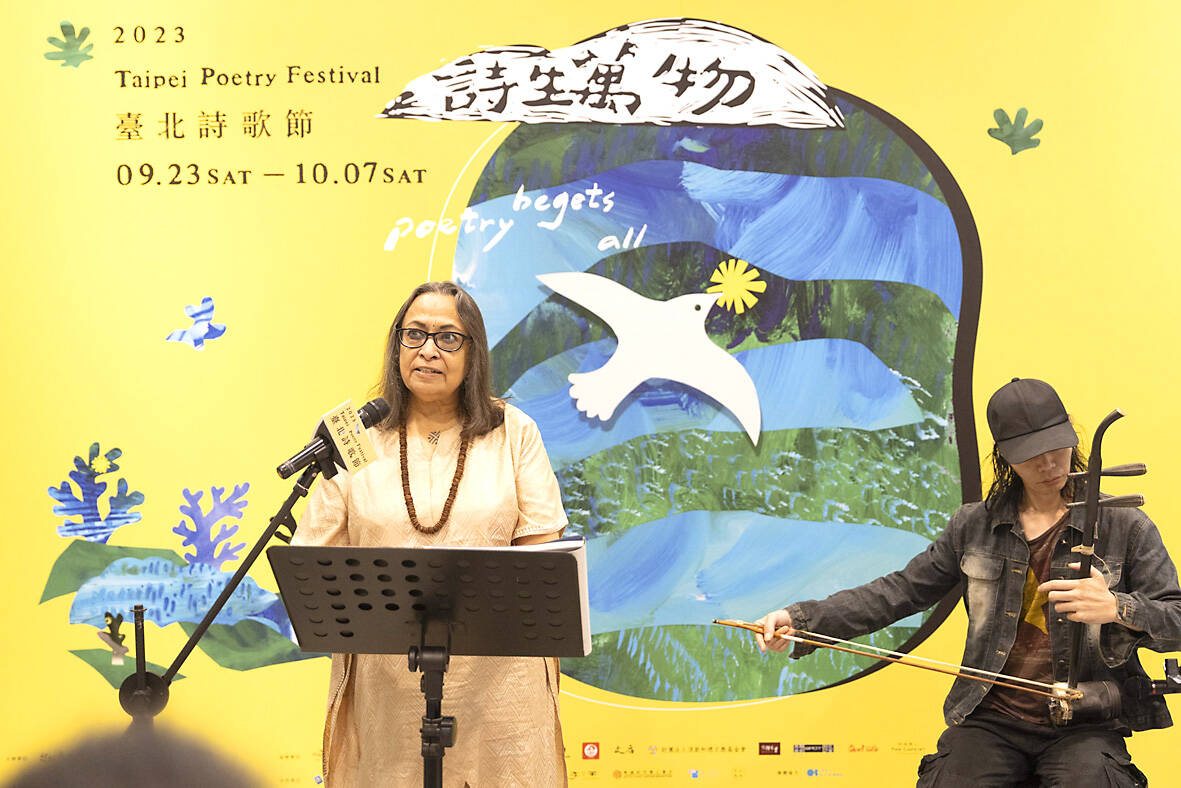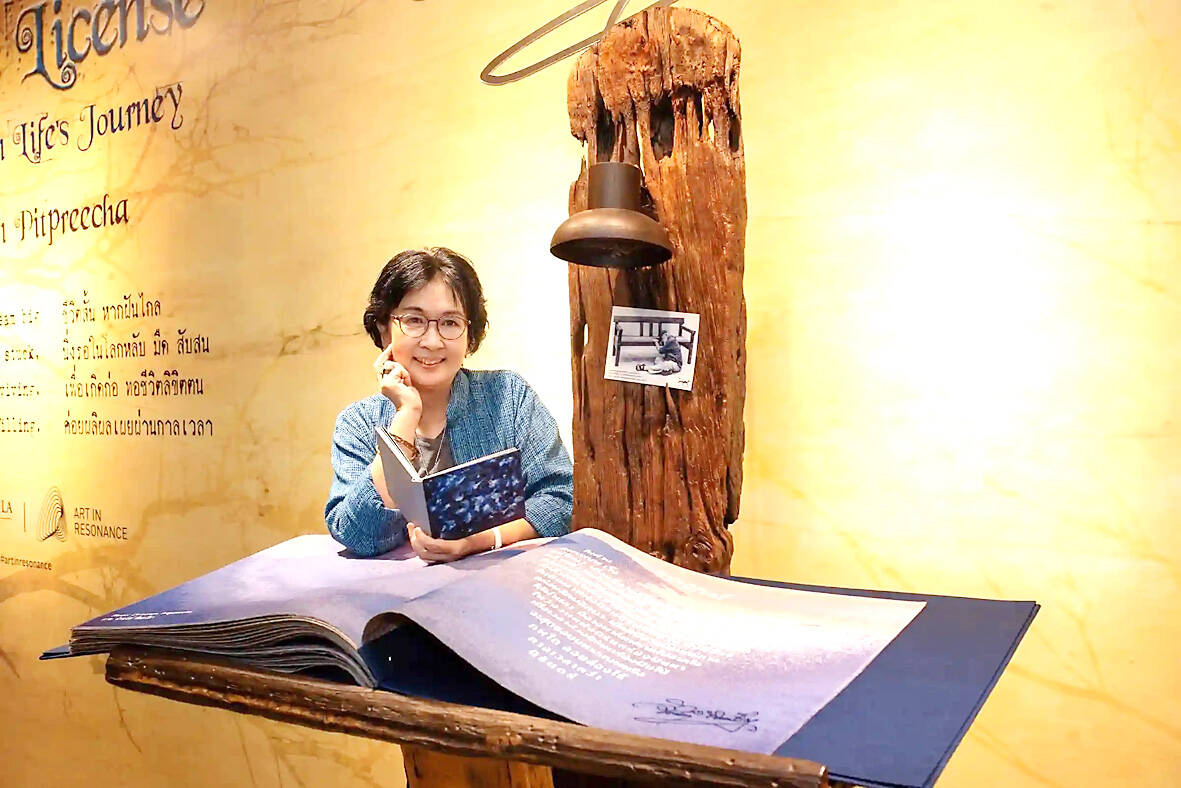After three years, the Taipei Poetry Festival (臺北詩歌節) is once more able to invite resident poets from abroad to spend time and create in Taiwan’s capital. Mumbai-based Bina, who will spend 17 days here, is also a designer and founded in 1997 the award-winning International Gallerie, an arts and ideas magazine.
This year’s festival theme is “Poetry Begets All” (詩生萬物), referring to the power of poetry to condense reality in a “magical leap.” Held from tomorrow to Oct. 7 in numerous cultural spaces across the city, events include performances, concerts, film screenings, book exhibitions, talks and activities. Poets will also be visiting schools and creating works with students.
Bina will speak at two events during the festival: “A Brief History of Women and Poetry” on Sunday with Taiwan-based Malaysian poet Maniniwei, and the Sept. 30 screening of Huang Ming-chuan’s (黃明川) Deepest Uprising (波濤最深處, reviewed Sept. 16, 2021), which features 16 Asian female poets. In addition to being one of the subjects, Bina was also a consultant for the documentary.

Photo courtesy of Taipei City Government
She will also take part in tomorrow’s opening show A Centennial Dialogue: The Fire and the Light at the Beginning of the Century (百年對話:世紀初的火與光), which connects Taiwanese poets from the turn of the 20th century to present day through the guidance of literature scholar Liao Chen-fu (廖振富) and poet Yang Chia-hsien (楊佳嫻). Musical acts Taugether (鬥鬧熱走唱隊) and Lo Si-rong (羅思容) will be interpreting both historic and modern Taiwanese poetry through ancient and contemporary tunes. Admission is free but tickets must be obtained in advance through kktix.com.
Other foreign guests include Chiranan Pitpreecha from Thailand, Maiko Sugimoto from Japan, Aurelia Lassaque from France and Chow Hon Fai from Hong Kong, who will be conversing with local creatives throughout the week.
■ Tomorrow to Oct. 7 at numerous locations in Taipei

Photo courtesy of Taipei City Government
■ On the net: poetryfestival.taipei/2023 for details

On April 26, The Lancet published a letter from two doctors at Taichung-based China Medical University Hospital (CMUH) warning that “Taiwan’s Health Care System is on the Brink of Collapse.” The authors said that “Years of policy inaction and mismanagement of resources have led to the National Health Insurance system operating under unsustainable conditions.” The pushback was immediate. Errors in the paper were quickly identified and publicized, to discredit the authors (the hospital apologized). CNA reported that CMUH said the letter described Taiwan in 2021 as having 62 nurses per 10,000 people, when the correct number was 78 nurses per 10,000

As we live longer, our risk of cognitive impairment is increasing. How can we delay the onset of symptoms? Do we have to give up every indulgence or can small changes make a difference? We asked neurologists for tips on how to keep our brains healthy for life. TAKE CARE OF YOUR HEALTH “All of the sensible things that apply to bodily health apply to brain health,” says Suzanne O’Sullivan, a consultant in neurology at the National Hospital for Neurology and Neurosurgery in London, and the author of The Age of Diagnosis. “When you’re 20, you can get away with absolute

May 5 to May 11 What started out as friction between Taiwanese students at Taichung First High School and a Japanese head cook escalated dramatically over the first two weeks of May 1927. It began on April 30 when the cook’s wife knew that lotus starch used in that night’s dinner had rat feces in it, but failed to inform staff until the meal was already prepared. The students believed that her silence was intentional, and filed a complaint. The school’s Japanese administrators sided with the cook’s family, dismissing the students as troublemakers and clamping down on their freedoms — with

As Donald Trump’s executive order in March led to the shuttering of Voice of America (VOA) — the global broadcaster whose roots date back to the fight against Nazi propaganda — he quickly attracted support from figures not used to aligning themselves with any US administration. Trump had ordered the US Agency for Global Media, the federal agency that funds VOA and other groups promoting independent journalism overseas, to be “eliminated to the maximum extent consistent with applicable law.” The decision suddenly halted programming in 49 languages to more than 425 million people. In Moscow, Margarita Simonyan, the hardline editor-in-chief of the